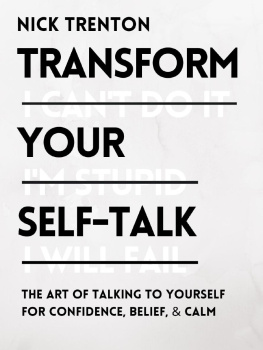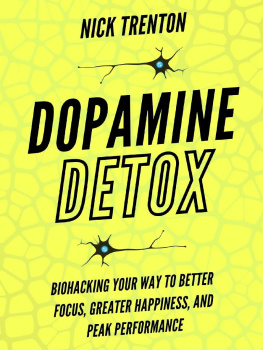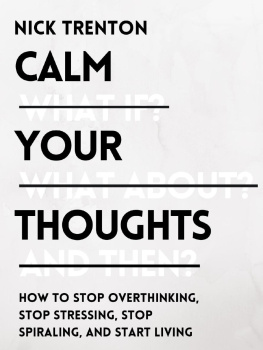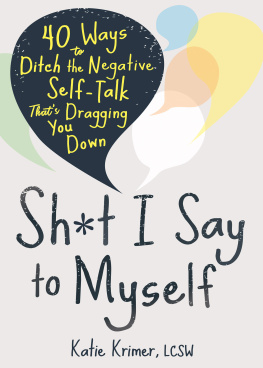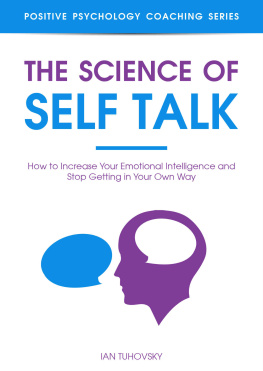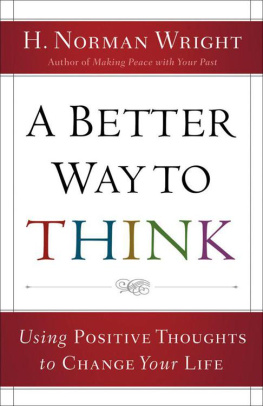Table of Contents
Transform Your Self-Talk:
How to Talk to Yourself for
Confidence, Belief, and Calm
by Nick Trenton
www.NickTrenton.com

Pick up your FREE 22-PAGE MINIBOOK: The 4 Essential Elements of Emotional Well-being and Happiness
- Unconventional ways to instantly de-stress and become present
- Live with intention because you know your core values
- 3 methods to scientifically enhance your mood and more fulfilled
<< Just click right here to gain inner motivation and quiet your mental chatter. >>
Table of Contents
Transform Your Self-Talk: The Art of Talking to Yourself for Confidence, Belief, and Calm
The Science of Self-Talk
Self-Talk as an Amplifier
Eenie, Meenie, Minie, Moe
Positive Versus Negative Self-Talk
A Simple Cost-Benefit Analysis
Meet Your Inner Critic
Five Levels of Self-Talk
The Key to Self-Awareness
Assessment Tools and Tips
Three-Step Cognitive Behavioral Therapy
Step 1: Observe
Step 2: Challenge
Step 3: Replace
Everyday Reinforcement
A Self-Empowerment Habit
The Culmination of Rewriting Your Self-Talk
Chapter 1. That Voice Inside Your Head
Its been there so long sometimes you barely even notice itthat little voice inside that quietly narrates, judges, encourages, explains or interprets the world around you. Though you may recognize the concept of an inner voice from self-help literature, the fact is theres nothing abstract or mysterious about this inner chatter. Self-talk actually has a surprising body of scientific evidence behind it, informing a fascinating set of theories that seek to understand exactly whats happening when we talk to ourselves.
In this book well take a closer look at what self-talk actually is, the various theories that have been proposed over the years to explain the phenomenon, and the facts weve amassed so far about both its psychology and physiology.
Well discover the different types of self-talk, investigate why it happens, explore whats normal and whats not, and most importantly, well see that self-talk can be changed for the better. As Bruce Lee famously said, As you think, so shall you become. Using a series of scientifically supported techniques to identify and improve your self-talk, you can take more conscious control of your thinking and perceptions, boosting confidence, self-mastery and resilience in a challenging world.
Self-talk is something we do every day, and this is partially why its so hard for us to change. We dont even realize we are doing it.
You wake up in the morning and the second you open your eyes the stream of thoughts starts flowing: What day is it? Oh right, Tuesday. I mustnt forget that appointment later this afternoon. God, I have such a bad memory, why am I such an idiot all the time? I bet Ill forget it. Typical. Im always doing things like that. Oh look, it seems like itll be a sunny day today. That reminds me, I have to get my mole scan done at some point but what if its cancer? But its not going to be. I mean, it might be. That would be just my luck. Great-Aunt Matilda had skin cancer. I think? If I die of cancer who will look after my kids? That would literally be the worst thing I could think of but whats the point in getting it checked out? Doctors are all useless That reminds me
You may not do all this every day, but you likely do some of this some days.
Self-talk is that stream-of-conscious, ongoing internal dialogue that runs inside our minds, affecting every aspect of our lives from our moods, to our behavior, to our self-confidence, to our appraisal of risk and reward. Its the constant conversation we have with ourselves. It can be neutral and mostly observational (oh right, its Tuesday), or filled with criticism, pessimism, doom and gloom (I shouldnt try that, Im not good enough). Often, all of the above become inseparable from the objective truth of a matter.
Our inner self-talk is the built-in narrator that runs alongside our lives, playing over everyday activities and in the background of every action or decision we make. This narration colors the entire tone of our lived experience, telling us how to interpret both good and bad experiences, and how to understand ourselves and our place in the world. It amounts to a narrative we tell ourselves, and this narrative is solidified well before we become adults.
Importantly, self-talk can be unconscious or conscious, negative or positive, beneficial to our lives or working entirely against our best interests. With some awareness and effort, negative and self-defeating inner talk can be identified and changed, so that the voice in your head supports rather than undermines you.
There are three primary types of self-talk.
The most obvious type is negative self-talk, and the thought-stream above is a prime example. These pessimistic interpretations, judgments, accusations, complaints, and catastrophic predictions leave us feeling awful. Some people in some circumstances might find negative self-talk motivational, but this comprises only a small percentage of negative self-talk (They said I cant do this? Ill prove them wrong! versus Im not good enough to do it, so I just wont try.). This is your inner self-critic who always sees the glass as half-empty. He can be useful and warn us about certain dangers, but again, that only takes place a rather small percentage of the time.
On the other hand, true motivational self-talk, or positive self-talk, is that which actively encourages and supports us as we navigate lifes challenges, aim for our goals or cope with difficulties. This can be an affirmation-style phrase that you consciously use to correct biased thinking, or it can be simply smiling at yourself in the mirror before an interview and saying, Im going to be great! I can do this and I certainly deserve it!
Neutral self-talk is the bulk of the internal conversation, and consists of simple observations and comments, while instructional self-talk is the kind of dialogue we have with ourselves to help us through certain tasks, sports or performance, for example: keep looking straight ahead, easy does it, and OK, try again but this time focus on the ball But even these statements can take a positive or negative tone if not carefully managed.
For the purposes of our book, well be looking primarily at negative and positive/motivational self-talkand how to turn the former into the latter.
The Science of Self-Talk
In 1911, neurologists Dr. Gordon Morgan Holmes and Dr. Henry Head published a series of papers exploring the connection between the body and the brain. They related a story of Victorian women who, at the time, would have worn large, fashionable feather hats and would sometimes duck to walk through a doorway even when they werent wearing the hats.
Why? The idea is that a persons mind holds a mental picture of what their body looks like, and acts accordingly. Dr. Branch Coslett of the University of Pennsylvania found, over a century later in 2013, that women with anorexia did something similarthey angled their bodies through doorways as though to squeeze through even when they clearly had enough room. Their mentalimage of themselves didnt match their actual selves.
What these seemingly simple observations tell us is something rather important: that we all have a mental representation of ourselves that may or may not align with reality. We do need this internal representation (or else wed bump into things a lot more often!), but some studies suggest that to our brains, imagining certain actions is no different neurologically to actually doing them.

